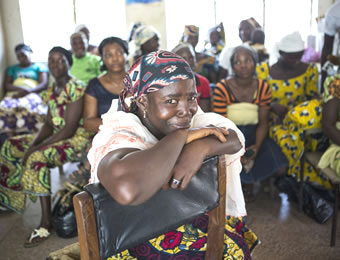In Nigeria, induced abortion is only legally permitted to save a woman’s life. Nonetheless, abortion is very common and most of the 2 million abortions that occur yearly are considered unsafe, leading to the death of 6,000 women and injury to many more. Most of these deaths could be prevented if these abortions were conducted safely.
An abortion is considered unsafe when it is carried out using methods not recommended by health professionals and/or in an environment that does not meet minimal medical standards.
Unsafe abortion is common among Nigerian women because most women are not aware of safe abortion methods. They rely on convenient options that are private, but occur in non-clinical settings.
Unsafe abortions disproportionately occur among disadvantaged women, including teenagers, poor and rural women who are less likely to access care to treat abortion complications. Women who never attended school, are poor, and live in rural areas are least likely to know about options for safe abortion.
Who wants an abortion?
About one in twenty women seek abortions of an unwanted pregnancy ever year. They come from all backgrounds, ages, family types, and places. Most recent abortions occur among women who are:
• Already mothers of one or more children,
• Married or living with a partner,
• Resident of urban areas,
• Current or former attendees of secondary school or higher,
• In their 20’s.
What Nigerian Women Say about why they resort to abortion
Because of the suffering and hardship in my family, I decided to abort the pregnancy. I could not afford to give birth to a child under such hardship.
ALSO READ: Ex-governorship candidate in Anambra, Oseloka Obaze, tests positive for COVID-19
–Age 38, married, 3 children
Myself and my husband were not together anymore…The problems I would have faced would have been too much: I put my two children in school, then the house rent, maintenance and feeding allowance. There was nobody to carry the burden with me.
–Age 44, 2 children, separated.
I only went to my sister. Because she is the only [person] I confide in. Then she took me to one native medicine seller. We went as far as two villages from our community to see this seller, that’s the risk we faced.
–Age 37, 7 children, married
He [the pharmacist] didn’t tell me anything…It’s as if the sale of this medicine is his major sale, so he doesn’t care to tell you what’s ahead. The only thing he is concerned about is the money. The shop is very busy. … When I drank the medicine, I just thank God that I was in my house. I wasn’t myself.
–Age unknown, childless, unmarried
What is postabortion care (PAC)?
With 2 million abortions every year, our health care facilities are faced with providing postabortion care to women who need it. Postabortion care includes emergency treatment for immediate and life-threatening complications after an abortion as well as longer-term services such as counselling, health checks, and family planning that help women avoid future unwanted pregnancies.
Why aren’t women getting the care they need?
Even though postabortion care saves women’s lives and protects their health, it is difficult to access. PAC services are not available at all health care facilities or are very limited. Only 1 in 3 women who experienced potential complications following an abortion received treatment of any kind at a health facility. Poor and rural women were less likely to receive care in a health facility compared to their urban and wealthy peers.
These results are from Performance Monitoring for Action (PMA). The project sought to improve estimates of several abortion-related indicators from 2018 to 2020. Our results provide new insights on the frequency, correlates, and safety of induced abortion in Nigeria.
Okon Charles Taye writes from Abuja.
WATCH TOP VIDEOS FROM NIGERIAN TRIBUNE TV
- Let’s Talk About SELF-AWARENESS
- Is Your Confidence Mistaken for Pride? Let’s talk about it
- Is Etiquette About Perfection…Or Just Not Being Rude?
- Top Psychologist Reveal 3 Signs You’re Struggling With Imposter Syndrome
- Do You Pick Up Work-Related Calls at Midnight or Never? Let’s Talk About Boundaries






